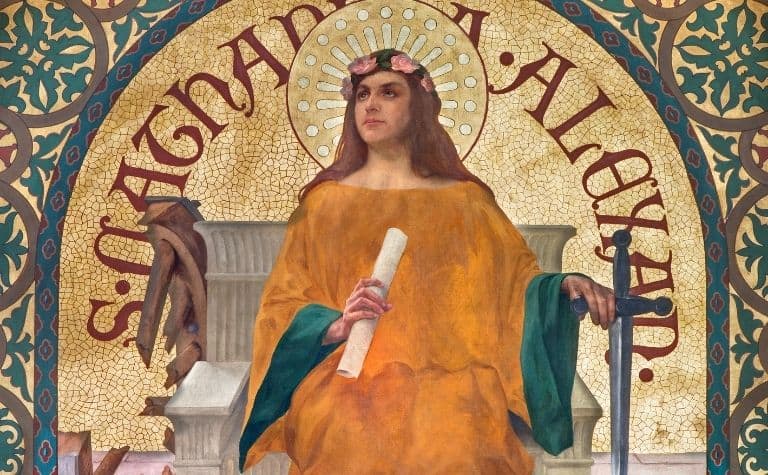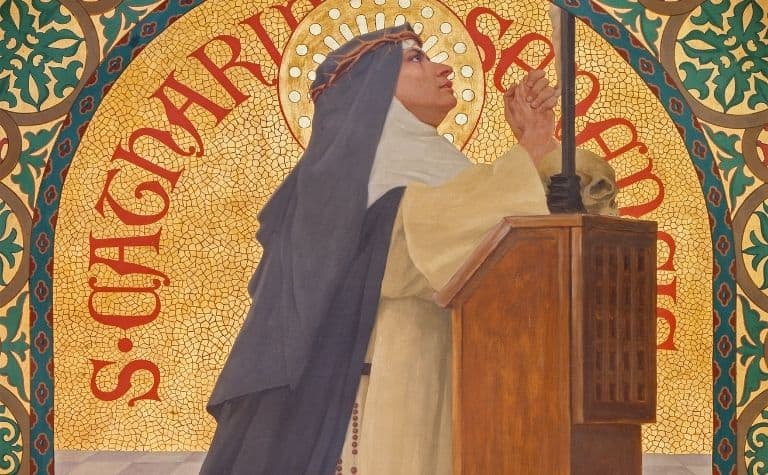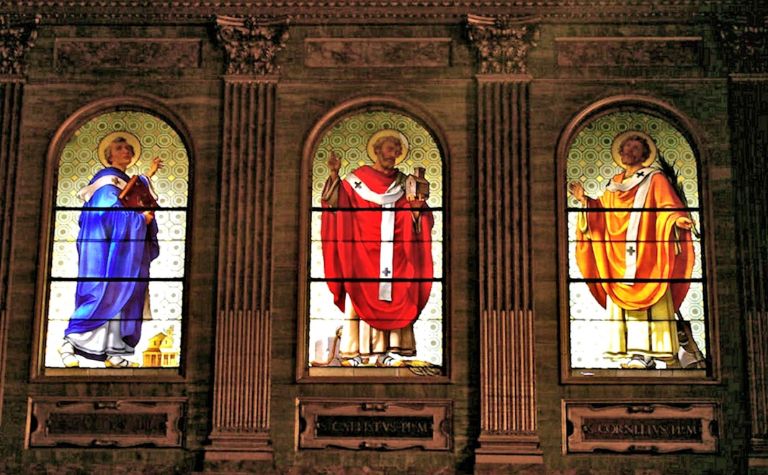The Methodist branch of Protestant Christianity has a rich theological tradition. Beginning with its founder, John Wesley (1703-1791), the leaders and members of the Methodist movement have championed doctrines like the Trinity, the atonement of Jesus Christ, and the inspiration of Scripture. But do Methodists believe in the saints?
Methodists believe that Scripture uses the term “saints” to describe believers in general instead of a canonized group of believers like in Roman Catholic theology. Methodists may refer to a person as a saint, such as “Saint Peter,” but that doesn’t imply they share Catholic convictions about sainthood.
What exactly do Methodists believe about saints? Do Methodists pray to the saints like Catholics? Why do Methodists observe All Saints Day? Keep reading to learn more.
Also, see Methodist vs. Evangelical: What’s the Difference? to learn more.

Do Methodists Pray to Saints?
Methodists don’t pray to saints or try to engage them personally in any type of communication. Instead, Methodists believe people should direct prayer to God alone.
Their conviction comes from the New Testament’s teaching that Jesus Christ is the only mediator between God and people. This conviction comes from verses like:
- 1 Timothy 2:5, “For there is one God, and there is one mediator between God and men, the man Christ Jesus.” (ESV)
- Hebrews 7:25, “Consequently, he is able to save to the uttermost those who draw near to God through him, since he always lives to make intercession for them.” (ESV)
- Hebrews 12:24, “And to Jesus, the mediator of a new covenant, and to the sprinkled blood that speaks a better word than the blood of Abel.” (ESV)
The Methodist tradition observes that the term “saints,” used in the Bible, refers to any believer, not just revered or influential ones. (Also see What Bible Translation Do Methodists Read?)
In the Old and New Testament, writers use the term to describe God’s people without mentioning any canonization or codification process for sainthood, like in the Catholic church. People find the term in Bible verses like:
- Psalm 30:4, “Sing praises to the Lord, O you his saints, and give thanks to his holy name.” (ESV)
- Daniel 7:27, “The greatness of the kingdoms under the whole heaven shall be given to the people of the saints of the Most High” (ESV)
- Romans 1:7, “To all those in Rome who are loved by God and called to be saints.” (ESV)
- 1 Corinthians 1:2, “To the church of God that is in Corinth, to those sanctified in Christ Jesus, called to be saints…” (ESV)
Based on this understanding, Methodists will employ the word “saint” in discussions, writing, or even church naming. “Saint Matthew’s,” “Saint Mark’s,” and “Saint John’s” are all names of Methodist churches. (Also see Do Methodists Pray to Mary?)
When people name Methodist churches after saints, they use primarily Apostles, not other figures from Christian history (e.g., Saint Augustine or Saint Patrick).
Most of the time, however, Methodists don’t name their churches after saints because it confuses people who associate the idea with Catholicism. (Also see Do Methodists Pray the Rosary?)
When a Methodist church names its building after a saint, it reflects how the term is used in Scripture alone and doesn’t suggest that it agrees with the Catholic teaching on the doctrine.
Other Protestant traditions also named their churches after saints, including those in the Reformed and Anglican traditions.
However, Baptist, Pentecostal, and non-denominational churches are less likely to name their churches after saints. (Also see Methodist vs. Baptist: What’s the Difference?)
The largest denomination in the Methodist tradition, the United Methodist Church, states that their belief in saints is rooted in the explicit teaching of the Bible, including the fact there Christ is the only mediator between God and people.
It states, “Our denomination does not have any system whereby people are elected to sainthood. We do not pray to saints, nor do we believe they serve as mediators to God. United Methodist believe “… there is one God; there is also one mediator between God and humankind, Christ Jesus, himself human who gave himself a ransom for all” (1 Timothy 2:5-6a). [1]

Catholic vs. Methodist Belief In the Saints Compared
Because Methodists and Catholics both use the word “saints” in their theology and liturgy, it’s essential to understand that there are significant differences in what they mean when they use the term.
What Methodists imply when they talk about “saints” isn’t the same as what Catholics imply when they refer to the “saints” and vice versa. (Also see Methodist vs. Catholic: What’s the Difference?)
- “Saints” in Methodist theology refers to believers. The Greek word translated “saints” in many popular English translations means “having been sanctified” and refers to anyone who has decided to follow Jesus Christ faithfully. Though every believer is worthy of respect, and those who have made a significant impact in the world for Christ should be honored, they aren’t to be exalted and revered as taught and practiced in Catholicism.
- “Saints” in Catholic theology refers to believers in previous centuries worthy of exaltation and reverence. The designation “saint” identifies uniquely devoted and influential Christians who deserve an esteemed status within the Church.
| “Saints” | Methodists | Catholicism |
|---|---|---|
| Are they believers? | yes | yes |
| Are they holy and consecrated? | yes | yes |
| Have certain believers lived extraordinarily exemplary lives? | yes | yes |
| Should such believers be canonized? | no | yes |
| Should such a believer be petitioned through the prayers of believer’s today? | no | yes |
| Does engaging with saints replace engagement with God? | no | it shouldn’t |
| Is attempted engagement with the deceased paganism? | some say yes | not the way the church teaches and practices it |
| Should images and relics of saints be used in worship? | no | they can be |

What Did John Wesley Believe About the Saints?
Wesley taught that it was wrong to revere saints and pray to them, as Catholicism teaches. Wesley believed this because he found no instruction or illustration for the practice in the New Testament.
He wrote, “The Romish doctrine concerning…worshiping, and adoration, as well of images as of relics, and also invocation of saints, is a fond thing, vainly invented, and grounded upon no warrant of Scripture, but repugnant to the Word of God.” [2]
The practice also violated doctrines he believed were taught, such as Christ being the only Mediator between God and people.
Other related practices to the Catholic doctrine of sainthood, like revering relics associated with saints, were considered at least a distraction and, at most, idolatry. (Also see Do Methodists Believe in Predestination?)
The United Methodist Church summarizes Wesley’s convictions in this way, “John Wesley believed we have much to learn from the saints, but he did not encourage anyone to worship them. He expressed concern about the Church of England’s focus on saints’ days and said that “most of the holy days were at present answering no valuable end.” [3]
Do Methodists Observe All Saints Day?
Like many other Christian traditions, the Methodist Church observes All Saints Day on November 1st every year. However, their observance isn’t veneration but consists of fondly recalling believers no longer living on Earth, though they are alive with God in heaven. (Also see Why Do Methodists Say the Apostles Creed?)
Methodists recall their faithfulness, devotion, and sacrificial service and seek to imitate these virtues in the Christian living.
The United Methodist Church explains, “We also recognize and celebrate All Saints’ Day (Nov. 1) and ‘all the saints who from their labors rest.’ All Saints’ Day is a time to remember Christians of every time and place, honoring those who lived faithfully and shared their faith with us. On All Saints’ Day, many churches read the names of their members who died in the past year.” [3]
References:
[1] Source
[2] Source
[3] Source
[4] Source
Related Questions
Methodism is a prominent branch of Protestant Christianity that dates to the mid-18th century. Pentecostalism is a movement within Protestantism that originated in the early 20th century. What's the...
Methodism and Lutheranism are two of the most influential Protestant Christian denominations. Many of their core beliefs are the same, yet they also have critical theological...
